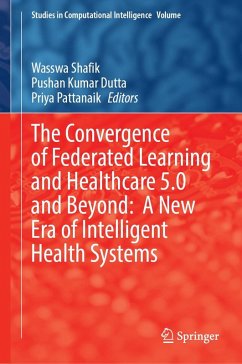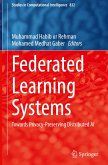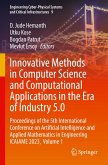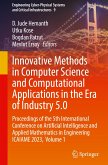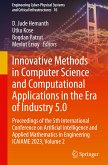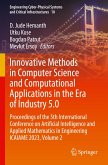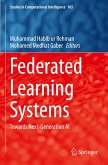The Convergence of Federated Learning and Healthcare 5.0 and Beyond: A New Era of Intelligent Health Systems
Herausgegeben:Shafik, Wasswa; Dutta, Pushan Kumar; Pattanaik, Priyadarshini
The Convergence of Federated Learning and Healthcare 5.0 and Beyond: A New Era of Intelligent Health Systems
Herausgegeben:Shafik, Wasswa; Dutta, Pushan Kumar; Pattanaik, Priyadarshini
- Gebundenes Buch
- Merkliste
- Auf die Merkliste
- Bewerten Bewerten
- Teilen
- Produkt teilen
- Produkterinnerung
- Produkterinnerung
This book introduces a novel integration of Federated Learning with the vision of Healthcare 5.0 to enable secure, adaptive, and intelligent health systems. It presents cutting-edge frameworks that support decentralized model training across medical institutions while preserving patient privacy and ensuring compliance with data regulations.
Focusing on real-world use cases, such as predictive diagnostics, edge-based patient monitoring, personalized medicine, and surgical robotics, it bridges theoretical advances with practical implementations. This book provides deep insights into the…mehr
Andere Kunden interessierten sich auch für
![Federated Learning Systems Federated Learning Systems]() Federated Learning Systems121,99 €
Federated Learning Systems121,99 €![Innovative Methods in Computer Science and Computational Applications in the Era of Industry 5.0 Innovative Methods in Computer Science and Computational Applications in the Era of Industry 5.0]() Innovative Methods in Computer Science and Computational Applications in the Era of Industry 5.0166,99 €
Innovative Methods in Computer Science and Computational Applications in the Era of Industry 5.0166,99 €![The Challenges of Era 5.0 in Accounting and Finance Innovation The Challenges of Era 5.0 in Accounting and Finance Innovation]() The Challenges of Era 5.0 in Accounting and Finance Innovation152,99 €
The Challenges of Era 5.0 in Accounting and Finance Innovation152,99 €![Innovative Methods in Computer Science and Computational Applications in the Era of Industry 5.0 Innovative Methods in Computer Science and Computational Applications in the Era of Industry 5.0]() Innovative Methods in Computer Science and Computational Applications in the Era of Industry 5.0166,99 €
Innovative Methods in Computer Science and Computational Applications in the Era of Industry 5.0166,99 €![Innovative Methods in Computer Science and Computational Applications in the Era of Industry 5.0 Innovative Methods in Computer Science and Computational Applications in the Era of Industry 5.0]() Innovative Methods in Computer Science and Computational Applications in the Era of Industry 5.0151,99 €
Innovative Methods in Computer Science and Computational Applications in the Era of Industry 5.0151,99 €![Innovative Methods in Computer Science and Computational Applications in the Era of Industry 5.0 Innovative Methods in Computer Science and Computational Applications in the Era of Industry 5.0]() Innovative Methods in Computer Science and Computational Applications in the Era of Industry 5.0151,99 €
Innovative Methods in Computer Science and Computational Applications in the Era of Industry 5.0151,99 €![Federated Learning Systems Federated Learning Systems]() Federated Learning Systems121,99 €
Federated Learning Systems121,99 €-
-
-
This book introduces a novel integration of Federated Learning with the vision of Healthcare 5.0 to enable secure, adaptive, and intelligent health systems. It presents cutting-edge frameworks that support decentralized model training across medical institutions while preserving patient privacy and ensuring compliance with data regulations.
Focusing on real-world use cases, such as predictive diagnostics, edge-based patient monitoring, personalized medicine, and surgical robotics, it bridges theoretical advances with practical implementations. This book provides deep insights into the design of scalable, privacy-preserving artificial intelligence infrastructures suited for cross-institutional collaboration.
It is designed for artificial intelligence researchers, digital health architects, healthcare technologists, and policy advisors. This supports the development of human-centric, resilient, and interoperable smart healthcare ecosystems.
Focusing on real-world use cases, such as predictive diagnostics, edge-based patient monitoring, personalized medicine, and surgical robotics, it bridges theoretical advances with practical implementations. This book provides deep insights into the design of scalable, privacy-preserving artificial intelligence infrastructures suited for cross-institutional collaboration.
It is designed for artificial intelligence researchers, digital health architects, healthcare technologists, and policy advisors. This supports the development of human-centric, resilient, and interoperable smart healthcare ecosystems.
Produktdetails
- Produktdetails
- Studies in Computational Intelligence Volume
- Verlag: Springer / Springer Nature Switzerland / Springer, Berlin
- Artikelnr. des Verlages: 89572009, 978-3-032-03984-2
- Seitenzahl: 1005
- Erscheinungstermin: 17. Dezember 2025
- Englisch
- Abmessung: 235mm x 155mm
- ISBN-13: 9783032039842
- ISBN-10: 3032039843
- Artikelnr.: 74989453
- Herstellerkennzeichnung
- Springer-Verlag GmbH
- Tiergartenstr. 17
- 69121 Heidelberg
- ProductSafety@springernature.com
- Studies in Computational Intelligence Volume
- Verlag: Springer / Springer Nature Switzerland / Springer, Berlin
- Artikelnr. des Verlages: 89572009, 978-3-032-03984-2
- Seitenzahl: 1005
- Erscheinungstermin: 17. Dezember 2025
- Englisch
- Abmessung: 235mm x 155mm
- ISBN-13: 9783032039842
- ISBN-10: 3032039843
- Artikelnr.: 74989453
- Herstellerkennzeichnung
- Springer-Verlag GmbH
- Tiergartenstr. 17
- 69121 Heidelberg
- ProductSafety@springernature.com
Wasswa Shafik (Member, IEEE) is a Computer Scientist, Information Technologist, and Director of the Dig Connectivity Research Laboratory (DCRLab) in Kampala, Uganda. He holds a Bachelor’s degree in Information Technology from Ndejje University (Uganda), a Master’s in Information Technology Engineering (Computer Networks) from Yazd University (Iran), and a PhD in Computer Science from Universiti Brunei Darussalam (Brunei). His research focuses on developing computationally and statistically efficient models in artificial intelligence and machine learning, with particular interest in Smart Agriculture, Computer Vision, Ecological Informatics, Applied AI, IoT, Cybersecurity, and Smart Computing. Dr. Shafik has authored and edited hundreds of peer-reviewed books, journal articles, and conference papers, including those presented at IEEE conferences and published in prestigious journals. He actively reviews for international journals indexed by Scopus, Compendex, and Web of Science. Academically, he has contributed to courses such as Mathematics for Data Science, Advanced Algorithms, and System Performance and Evaluation. Earlier, he was a Research Associate at Iran’s Intelligent Network Laboratory. His professional roles have also included Community Data Officer at the Programme for Accessible Health, Data Manager at Population Services International, Research Assistant at the Socio-Economic Data Center, Research Lead at TechnoServe, and former CEO of Asmaah Charity Organisation. Dr. Pushan Kumar Dutta is an Associate Professor Grade at Amity University Kolkata in the Electronics and Communication Engineering department. He holds a Ph.D. from Jadavpur University and completed a post-doctorate as an Erasmus Mundus Scholar under the European Union Leaders Program (2015–2016) at the University of Oradea. His research interests include data mining, AI, edge computing, and predictive analytics, with applications in smart cities, healthcare, and sustainability. Dr. Dutta has published over 114 Scopus-indexed articles and numerous works in IEEE Xplore and Springer Lecture Notes. A recipient of the ‘Mentor of Change’ by NITI Aayog and other awards, he is known for his innovative teaching methods, two Indian patents, and international contributions, including winning an international white paper contest. Dr. Priya Pattanaik is a lecturer at the Berlin School of Business and Innovation in Germany. Her research skills are primarily in quantitative analysis and developing machine learning algorithms with deep neural networks and graphical models for visual computing, including medical image analysis and disease detection. She worked as a postdoctoral scientist at IMT Atlantique, France, in the Image and Information Processing department of the LaTIM research group, focusing on developing concepts and tools to address one of the great challenges of the Musculoskeletal (MSK) field: understanding and exploiting the link between the shape and function of a joint (2020-2022). She also worked as a postdoctoral fellow in collaboration with a range of academic institutions and industrial partners, such as Télécom SudParis, the University of Saclay, a team from the Centre for Mathematical Morphology of Mines ParisTech, and the company TRIBVN (2019). In March 2019, she successfully defended her doctoral thesis, which focuses on the use of machine learning for classifying microscopic blood smear images to detect malaria early. She has numerous publications in high-impact SCI and Scopus-indexed research journals and conferences.
Understanding Healthcare 5.0 and Emerging Technologies.- Fundamentals of Federated Learning: Principles and Applications.- Data Privacy Challenges in Artificial Intelligence-Driven Healthcare.- Regulatory Frameworks: HIPAA, GDPR, and Compliance in Federated Learning.- Real Time Patient Monitoring and IOMT Applications.- Integration of Blockchain Technology for Ensuring Trust and Security in the Digital Health Market: A Comprehensive Review.- The Convergence of Federated Learning for the Digital Healthcare Market: An Overview.- Differential Privacy and Homomorphic Encryption in Healthcare Artificial Intelligence.- Analysis of Consumer Emotions Impacted By COVID-19.- Guiding The Development of AI In Healthcare Through Ethical Considerations and Effective Governance.- Intelligent Workforce Management in Healthcare 5.0: Redefining HR Through Federated Learning.- The Legal Labyrinth of Smart Wearable Medical Devices: A Literary Overview.- From Traditional to Intelligent: Transforming Global Health Care through Innovation.- Ethical Considerations of Emotion AI used in the Synthetic Media Generations and Applications.- Machine Learning-Based Prediction of Gene-Disease Associations for Reliable Evidence.- Addressing Computational Overhead in Federated Learning Models in Healthcare 5.0 and Beyond.- Robustness Against Adversarial Attacks and Model Security in Healthcare 5.0 and Beyond.-Scalable Model Aggregation and Interoperability Solutions in Healthcare Systems.- Federated Learning for Decentralized Healthcare: Privacy, Efficiency, and Scalability in Healthcare 5.0.- Federated Learning Architectures: Centralized Vs. Decentralized Models In Human Resource(HR).- A Two-staged Optimized Stacking Ensemble learning Classifier for the Prediction of Cervical Cancer.- AI-Assisted Histopathological Image Analysis for Automated Gastric Cancer Detection.- Robotics and AI-Powered Surgical Interventions in Gastric Cancer: Enhancing Precision and Efficacy of Oncologic Treatment24. Electronic Health Records using Blockchain.- Centralized vs. Decentralized Federated Learning Architectures: Design Trade-offs, Security, and Performance in Healthcare 5.0 Applications.- Navigating Healthcare 5.0: How Emerging Technologies Are Transforming Care Delivery and Medical Innovation.- Identification of Stress in IT Professionals Using Convolutional Neural Network.- Federated Learning for Precision Medicine: A Blockchain Enhanced Framework for Privacy Preserving Predictive Analytics in Healthcare 5.0.- Machine Learning Advancements for Diabetes Prediction with LightGBM.- Blockchain Integration for Enhanced Trust and Security in Federated Learning for Healthcare 5.0.- Ontology-Based Data Harmonization and Federated Transfer Learning: Enabling Scalable and Interoperable Intelligence in Healthcare 5.0 for Next-Generation Healthcare.- Future Trends in Federated Learning for Next-Generation Healthcare.- Advancing Federated Learning in Healthcare 5.0.- A Futuristic Pathway in Healthcare.- Federated Learning in Healthcare Finance: A Systematic Review of Privacy-Preserving Models.- AI-Induced Digital Addiction: Its Impact on Human Relationships within Healthcare 5.0 Ecosystems.- Real-Time Detection of Latent Infections Using LSTM and IoMT-Based Health Monitoring.- Federated Learning and Healthcare 5.0: Paving the Road Ahead for Privacy-Preserving Smart Health Systems.- Neuro-Symbolic Federated Learning Models for Diagnostic Intelligence in Healthcare 5.0.- Reducing Computational Overhead in Federated Learning: A Comprehensive Analysis.- Future Trends in Federated Learning: Enabling Secure and Personalized Healthcare Solutions.
Understanding Healthcare 5.0 and Emerging Technologies.- Fundamentals of Federated Learning: Principles and Applications.- Data Privacy Challenges in Artificial Intelligence-Driven Healthcare.- Regulatory Frameworks: HIPAA, GDPR, and Compliance in Federated Learning.- Real Time Patient Monitoring and IOMT Applications.- Integration of Blockchain Technology for Ensuring Trust and Security in the Digital Health Market: A Comprehensive Review.- The Convergence of Federated Learning for the Digital Healthcare Market: An Overview.- Differential Privacy and Homomorphic Encryption in Healthcare Artificial Intelligence.- Analysis of Consumer Emotions Impacted By COVID-19.- Guiding The Development of AI In Healthcare Through Ethical Considerations and Effective Governance.- Intelligent Workforce Management in Healthcare 5.0: Redefining HR Through Federated Learning.- The Legal Labyrinth of Smart Wearable Medical Devices: A Literary Overview.- From Traditional to Intelligent: Transforming Global Health Care through Innovation.- Ethical Considerations of Emotion AI used in the Synthetic Media Generations and Applications.- Machine Learning-Based Prediction of Gene-Disease Associations for Reliable Evidence.- Addressing Computational Overhead in Federated Learning Models in Healthcare 5.0 and Beyond.- Robustness Against Adversarial Attacks and Model Security in Healthcare 5.0 and Beyond.-Scalable Model Aggregation and Interoperability Solutions in Healthcare Systems.- Federated Learning for Decentralized Healthcare: Privacy, Efficiency, and Scalability in Healthcare 5.0.- Federated Learning Architectures: Centralized Vs. Decentralized Models In Human Resource(HR).- A Two-staged Optimized Stacking Ensemble learning Classifier for the Prediction of Cervical Cancer.- AI-Assisted Histopathological Image Analysis for Automated Gastric Cancer Detection.- Robotics and AI-Powered Surgical Interventions in Gastric Cancer: Enhancing Precision and Efficacy of Oncologic Treatment24. Electronic Health Records using Blockchain.- Centralized vs. Decentralized Federated Learning Architectures: Design Trade-offs, Security, and Performance in Healthcare 5.0 Applications.- Navigating Healthcare 5.0: How Emerging Technologies Are Transforming Care Delivery and Medical Innovation.- Identification of Stress in IT Professionals Using Convolutional Neural Network.- Federated Learning for Precision Medicine: A Blockchain Enhanced Framework for Privacy Preserving Predictive Analytics in Healthcare 5.0.- Machine Learning Advancements for Diabetes Prediction with LightGBM.- Blockchain Integration for Enhanced Trust and Security in Federated Learning for Healthcare 5.0.- Ontology-Based Data Harmonization and Federated Transfer Learning: Enabling Scalable and Interoperable Intelligence in Healthcare 5.0 for Next-Generation Healthcare.- Future Trends in Federated Learning for Next-Generation Healthcare.- Advancing Federated Learning in Healthcare 5.0.- A Futuristic Pathway in Healthcare.- Federated Learning in Healthcare Finance: A Systematic Review of Privacy-Preserving Models.- AI-Induced Digital Addiction: Its Impact on Human Relationships within Healthcare 5.0 Ecosystems.- Real-Time Detection of Latent Infections Using LSTM and IoMT-Based Health Monitoring.- Federated Learning and Healthcare 5.0: Paving the Road Ahead for Privacy-Preserving Smart Health Systems.- Neuro-Symbolic Federated Learning Models for Diagnostic Intelligence in Healthcare 5.0.- Reducing Computational Overhead in Federated Learning: A Comprehensive Analysis.- Future Trends in Federated Learning: Enabling Secure and Personalized Healthcare Solutions.

